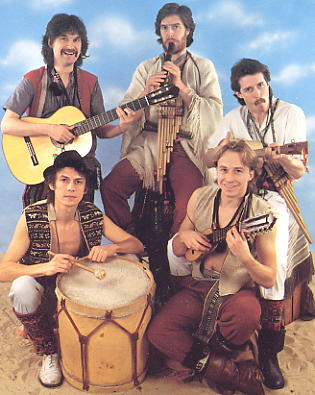|
Incantation
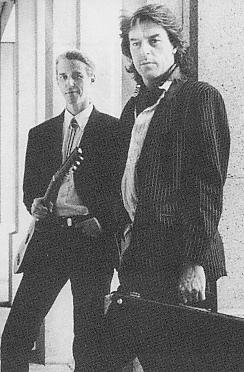 Incantation
initially aroused my interest with their haunting and evocative contribution
to my own personal favourite film score, the music from The
Mission. Set in the rainforests
of South America, The Mission, directed by Roland Joffe in 1986 and starring
Robert De Niro and Jeremy Irons, is a story of the struggle for the body
and soul of the native Guarani Indians between misguided Jesuit priests
and the conquering Spanish colonialists. The superb film score was penned
by the Italian master Ennio Morricone and
tracks like Gabriel's Oboe and On Earth As It Is In Heaven were brought
to life by the vivid and imaginative instrumentation of Incantation and
the excellent orchestration of the London Philharmonic. It was later to
attract an Oscar nomination for its soundtrack while collecting Golden
Globe and BAFTA awards and best score at the Cannes film festival. Incantation
initially aroused my interest with their haunting and evocative contribution
to my own personal favourite film score, the music from The
Mission. Set in the rainforests
of South America, The Mission, directed by Roland Joffe in 1986 and starring
Robert De Niro and Jeremy Irons, is a story of the struggle for the body
and soul of the native Guarani Indians between misguided Jesuit priests
and the conquering Spanish colonialists. The superb film score was penned
by the Italian master Ennio Morricone and
tracks like Gabriel's Oboe and On Earth As It Is In Heaven were brought
to life by the vivid and imaginative instrumentation of Incantation and
the excellent orchestration of the London Philharmonic. It was later to
attract an Oscar nomination for its soundtrack while collecting Golden
Globe and BAFTA awards and best score at the Cannes film festival.
Morricone himself, is one of the most successful
and influential of modern screen composers with over 400 film scores to
his credit. He has enhanced movies with his distinctive style for the
last thirty years - from the twangy spaghetti western sounds of Sergio
Leone's A Fistful of Dollars, through films like 1900, Days of Heaven,
Once Upon A Time In America, Frantic, The Untouchables, Bugsy, Hamlet,
Cinema Paradiso, Casualties of War and In the Line of Fire up to his latest
scores for mainstream, big-budget movies like Wolf and Lolita. The Mission
however, was Incantation's first film work and the initial contact with
Morricone came out of the blue when the film's production company, Goldcrest
Films rang and asked founder members Mike Taylor and Tony Hinnigan to go
and meet him. As Taylor recalls, "Tony and myself did all the Indian instrumentation
on The Mission as the South American members of the band at the time didn't
read music. They were involved only in some percussion work. It took two
days - some time with the orchestra, the rest of the time overdubbing.
Mr Morricone had me hitting the bombo (large drum) so hard and for so
long - my fingers bled!"
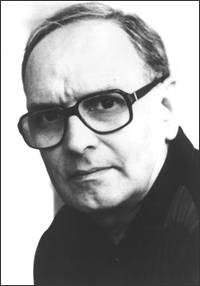 Morricone himself (pictured right), not
only composed the score but also arranged the orchestration and conducted
the London Philharmonic during the recording which took place in the Wembley
studios of CTS in late 1985. "He is typically Italian - mildly eccentric,
extremely intense, shouts a lot and is also a genius and an extremely
nice man behind all the front!.......obviously working with him was a
pleasure and an honour," recalls Taylor in admiration of his collaboration
with the Italian maestro. Morricone obviously has a high regard for Taylor's
talents as well, incorporating his solo flute in the score for the 1992
Patrick Swayze film set in India, City of Joy. Meanwhile , Hinnigan's
expertise has been recognised by Oscar-winning film composer Michael Nyman,
who persuaded him to guest on a world tour to promote the soundtrack of
the film, The Piano. Morricone himself (pictured right), not
only composed the score but also arranged the orchestration and conducted
the London Philharmonic during the recording which took place in the Wembley
studios of CTS in late 1985. "He is typically Italian - mildly eccentric,
extremely intense, shouts a lot and is also a genius and an extremely
nice man behind all the front!.......obviously working with him was a
pleasure and an honour," recalls Taylor in admiration of his collaboration
with the Italian maestro. Morricone obviously has a high regard for Taylor's
talents as well, incorporating his solo flute in the score for the 1992
Patrick Swayze film set in India, City of Joy. Meanwhile , Hinnigan's
expertise has been recognised by Oscar-winning film composer Michael Nyman,
who persuaded him to guest on a world tour to promote the soundtrack of
the film, The Piano.
The beginnings of a productive partnership began
in 1972 when Mike Taylor and Tony Hinnigan arrived in London, from Belfast
and Glasgow respectively. They took time off from their classical studies
at the Royal College of Music and the Guildhall to explore their mutual
interest in a wide variety of music. In 1981 they were commissioned by
the Ballet Rambert and Christopher Bruce to write some Andean music for
a show they were to perform, called Ghost Dances. When it came to researching
the sound, both Taylor and Hinnigan were hooked. "It was like nothing
we'd heard before....we went for it full throttle." The two were attracted
to acoustic instruments and became proficient players of the pipes, zamponas,
as well as the quena and Andean percussion and a recording contract was
offered by the recording label Beggars Banquet before the band had even
been named!
In 1982 and now known as Incantation , they
quickly came to prominence both at home and abroad with the joint release
of their debut album, On The Wing of A Condor (or variously known as Cacharpaya or Panpies of The Andes)
and single, Cacharpaya, an Andean festival tune, in October of that year.
Perhaps suprisingly for an instrumental outfit, the single reached twelfth
spot in the charts while the album, with memorable tunes like Dolencias,
Papel De Plata and Friends of The Andes, made the UK Top Ten and stayed
in the charts for over six months, selling in excess of 300,000 copies.
It was a stunning start for the band line-up of Simon Rogers, Chris Swithinbank
and Forbes Henderson alongside the gifted and classically-trained duo
of Taylor and Hinnigan, who've since gone on to have three gold albums
since their debut.
They followed their initial success with subsequent
album releases of mainly Andean and Latin American compositions - Dance
of The Flames (1983) which included El Condor Pasa, Cutimuy and Atahuallpa,
Virgins of The Sun (1984),
Panpipes of The Andes - Best of Incantation
(1986) and the more diverse
The Meeting
(1987), interspersing their studio work with regular live performances
and extensive television and varied film-work. Of the latter, their success
with The Mission brought the band to the attention of other well-known
film composers and they've subsequently collaborated on at least a dozen
films with the American composer James Horner, including Willow, Land
Before Time, Field of Dreams, Honey I Shrunk The Kids, House of Cards,
Once Upon a Forest, Jumanji and two Harrison Ford thrillers, Patriot Games
and Clear and Present Danger, as well as Legends of the Fall. Other film
scores on which they've participated include Far & Away (with John
Williams), Farewell To The King (Basil Poledouris) and A Handful of Dust
(George Fenton) and more recently, Horner's Braveheart, Wings of Courage
and David Newman's The Phantom (1996), not to mention numerous television
programmes and adverts.
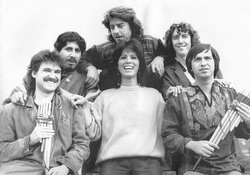 The
band has toured extensively in the UK, Europe, the Middle East as well
as North and South America. Whilst in Peru and Bolivia, a 60-minute documentary
about the band was filmed for Channel 4 in 1984. Two members (Rogers and
Swithinbank) of the original line-up left the group in January 1985 and
the three remaining members were joined by three Chilean exiles, Claudia
Figuerora, Sergio Avila and Mauricio Venegas, who themselves performed
together in their own band, Quimantu. A compilation album, The Best of
Incantation was released in December 1985 and in excess of 125,000 copies
were sold. Taylor and Hinnigan took a four-year break from touring and
live performances to concentrate on their film and tv work. In 1992 they
appeared on Jeff Wayne' s musical version of Spartacus. Reforming the
band in 1993 as a seven-piece outfit, without the involvement of the Chilean
trio, they completed a 27-date national tour to promote their sixth album,
On Gentle Rocks, a rich and
vibrant blend of simple and traditional tunes and melodies, that included
Find The Child, the theme music from the film, Willow. The
band has toured extensively in the UK, Europe, the Middle East as well
as North and South America. Whilst in Peru and Bolivia, a 60-minute documentary
about the band was filmed for Channel 4 in 1984. Two members (Rogers and
Swithinbank) of the original line-up left the group in January 1985 and
the three remaining members were joined by three Chilean exiles, Claudia
Figuerora, Sergio Avila and Mauricio Venegas, who themselves performed
together in their own band, Quimantu. A compilation album, The Best of
Incantation was released in December 1985 and in excess of 125,000 copies
were sold. Taylor and Hinnigan took a four-year break from touring and
live performances to concentrate on their film and tv work. In 1992 they
appeared on Jeff Wayne' s musical version of Spartacus. Reforming the
band in 1993 as a seven-piece outfit, without the involvement of the Chilean
trio, they completed a 27-date national tour to promote their sixth album,
On Gentle Rocks, a rich and
vibrant blend of simple and traditional tunes and melodies, that included
Find The Child, the theme music from the film, Willow.
Their distinctive and intoxicating style is a fusion
of differing ethnic cultures and influences - native Latin American and
Irish celtic folk are two that readily spring to mind - although their
spiritually uplifting and emotional Andean folk themes are their forte,
in which they combine a fascinating range of traditional panpipes, flutes
and percussion with more contemporary keyboards and guitars. Experts on
indigenous instruments like the zampona, sikus, tarka, pinkillo and quena
(panpipes and flutes), as well as the charango, caja, tiple and chajchas,
the band play at least thirty different instruments during their stage
set which also includes drums, keyboards, bombo, bass and acoustic guitar.
Amongst the band's most recent projects, which've
included two 'masses' composed by them and performed with the Coventry
Cathedral Choir, is the release of the collection of pieces entitled Ghost
Dances & Sergeant Early's Dream for the
Rambert Dance Company to complement the dance company's best known ballets
from their contemporary repertory, in conjuction with the Sergeant Early
Band. It was in 1985 that Christopher Bruce choreographed a new dance
called 'Sergeant Early's Dream' and the fusion of Irish and British traditional
music was performed by the muscians interacting with the dancers on stage.
Playing alongside Hinnigan and Taylor were notables like Steve Tilston,
Maggie Boyle and Paul Brennan and they played major venues in Europe with
the seven-piece band. The Sergeant Early Band was briefly revived in the
early 90's and the CD release is a product of that revival. In 1994 Incantation
released a collection of tunes and Christmas carols with a selection of
guest soloists and musicians, re-interpreting them without any constraints
of tradition or style, entitled Songs For The Seasons.
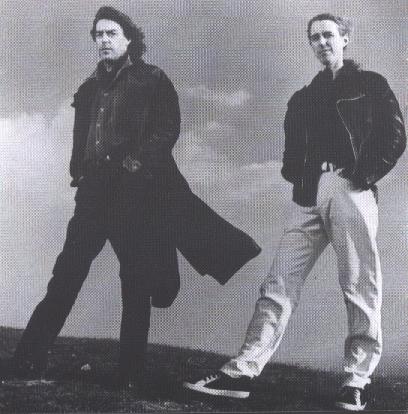 With the band under the auspices of the Cooking Vinyl label, they
embarked on some selective gigs in June 1995 to promote their third album
release on their new label. In a return to their instrumental Andean roots
the self-titled album, Incantation, includes a re-working of the classic Cacharpaya and reached the
top ten of the UK independent album charts in October, preceding a 20-date
UK tour the following autumn. The most recent film which benefitted from
Mike Taylor's diverse skills was the 1996 release Loch Ness but it was
to be his last as one half of his partnership with Hinnigan. The end of
the year saw the band's two founder members break up after nearly 25 years
in tandem, with Hinnigan and the rest of the line-up including experienced
musicians, guitarist James Woodrow, Nigel Thomas (drums), Ollie Nicholls
(keyboards) and Phil Scragg (bass), resuming a 14-date tour in June 1997.
A 'best of' compilation album entitled Geoglyph
was released in June 1998, bringing together sixteen of their best known
tracks. Later in the same year, Remembrance,
a compilation CD with work from The Meeting, Ghost Dances and Sergeant
Early's Dream also became available on general release. In addition to
their collaboration as Incantation, Hinnigan was also a member of the
Balanescu Quartet, whilst Taylor played with the innovative Carlos Bonell
Ensemble, touring far and wide and helping to capture the emotions of
traditional Spanish and Latin-American music on their The Sea In Spring
album release. He's also featured on solo albums by David Lanz, Karl Jenkins,
Luis Cobos, Steve Tilston and Michael Crawford. With the band under the auspices of the Cooking Vinyl label, they
embarked on some selective gigs in June 1995 to promote their third album
release on their new label. In a return to their instrumental Andean roots
the self-titled album, Incantation, includes a re-working of the classic Cacharpaya and reached the
top ten of the UK independent album charts in October, preceding a 20-date
UK tour the following autumn. The most recent film which benefitted from
Mike Taylor's diverse skills was the 1996 release Loch Ness but it was
to be his last as one half of his partnership with Hinnigan. The end of
the year saw the band's two founder members break up after nearly 25 years
in tandem, with Hinnigan and the rest of the line-up including experienced
musicians, guitarist James Woodrow, Nigel Thomas (drums), Ollie Nicholls
(keyboards) and Phil Scragg (bass), resuming a 14-date tour in June 1997.
A 'best of' compilation album entitled Geoglyph
was released in June 1998, bringing together sixteen of their best known
tracks. Later in the same year, Remembrance,
a compilation CD with work from The Meeting, Ghost Dances and Sergeant
Early's Dream also became available on general release. In addition to
their collaboration as Incantation, Hinnigan was also a member of the
Balanescu Quartet, whilst Taylor played with the innovative Carlos Bonell
Ensemble, touring far and wide and helping to capture the emotions of
traditional Spanish and Latin-American music on their The Sea In Spring
album release. He's also featured on solo albums by David Lanz, Karl Jenkins,
Luis Cobos, Steve Tilston and Michael Crawford.
 Hinnigan,
a musical workaholic, has resumed his partnership with the Oscar-winning
composer James Horner and collaborated on some of Hollywood's most notable
films in the last couple of years. Horner is much in demand and he's scored
films like the blockbuster Titanic (where Hinnigan memorably accompanied
Celine Dion on the number one smash hit, 'My Heart Will Go On' on low
whistle) and The Devil's Own in 1997, followed by The Mask of Zorro and
Mighty Joe Young in 1998 and co-produced The Four Feathers in 2002. Its
a partnership that has already paid rich dividends. In addition, Hinnigan
has toured extensively around the world as part of the Michael Nyman Band
over the last few years. Nyman is another film soundtrack composer who
has used Hinnigan's undoubted talents on film scores such as Drowning
By Numbers, Prospero's Books, 6 Days 6 Nights, The Cook, the Thief, his
Wife and her Lover, Carrington, The Piano, The End of the Affair (1999),
The Claim and Wonderland (2000), as well as other recordings like Live,
AET and Al Confini. Hinnigan has also been featured on Derek Jarman's
Blue, Lee Holdridge's tv serial score The Mists of Avalon (2001) as well
as solo albums by artists as varied as Celine Dion, Nick Kershaw, guitarist
Steve Tilston & Maggie Boyle, Ocean Colour Scene, David Lanz, John
Harle, Luis Cobos, Bert Jansch, DJ Sakin, Dany Brillant, David Ferguson
and Rosemary Duxbury. As a member of the innovative Balanescu Quartet
he's appeared on album releases by Gavin Bryars and Jean-Luc Fafchamps.
In July 2003, Hinnigan released his own album, Camera - Reflections on
Film Music, on the Cooking Vinyl label, showcasing his film work since
The Mission, including fifteen scores especially reinterpreted for this
release. At the same time he continues to tour and record as part of The
Michael Nyman Band. Hinnigan,
a musical workaholic, has resumed his partnership with the Oscar-winning
composer James Horner and collaborated on some of Hollywood's most notable
films in the last couple of years. Horner is much in demand and he's scored
films like the blockbuster Titanic (where Hinnigan memorably accompanied
Celine Dion on the number one smash hit, 'My Heart Will Go On' on low
whistle) and The Devil's Own in 1997, followed by The Mask of Zorro and
Mighty Joe Young in 1998 and co-produced The Four Feathers in 2002. Its
a partnership that has already paid rich dividends. In addition, Hinnigan
has toured extensively around the world as part of the Michael Nyman Band
over the last few years. Nyman is another film soundtrack composer who
has used Hinnigan's undoubted talents on film scores such as Drowning
By Numbers, Prospero's Books, 6 Days 6 Nights, The Cook, the Thief, his
Wife and her Lover, Carrington, The Piano, The End of the Affair (1999),
The Claim and Wonderland (2000), as well as other recordings like Live,
AET and Al Confini. Hinnigan has also been featured on Derek Jarman's
Blue, Lee Holdridge's tv serial score The Mists of Avalon (2001) as well
as solo albums by artists as varied as Celine Dion, Nick Kershaw, guitarist
Steve Tilston & Maggie Boyle, Ocean Colour Scene, David Lanz, John
Harle, Luis Cobos, Bert Jansch, DJ Sakin, Dany Brillant, David Ferguson
and Rosemary Duxbury. As a member of the innovative Balanescu Quartet
he's appeared on album releases by Gavin Bryars and Jean-Luc Fafchamps.
In July 2003, Hinnigan released his own album, Camera - Reflections on
Film Music, on the Cooking Vinyl label, showcasing his film work since
The Mission, including fifteen scores especially reinterpreted for this
release. At the same time he continues to tour and record as part of The
Michael Nyman Band.
|
















